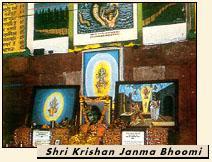|

Revered as the most endearing of the Hindu gods, Shri Krishna is fondly remembered for his charm, his mischievous pranks and his extraordinary exploits. As the charioteer and preceptor to Arjun in the famous battle of Kurukshetra, he revealed to the world the supreme truths of life.
Shri Krishna, an incarnation of Lord Vishnu, was born in the Dwapara Yuga as the eighth son of the Yadava prince Vasudev and his wife Devaki. To save him from the murderous intentions of his maternal uncle Kansa, the ruler of Mathura, the infant Krishna was spirited away soon after birth to Gokul, the village of the gopas (cowherds) in Braj (their pastureland). It was here that he grew to manhood, in the tender care of his foster parents Nand and Yashoda in the happy company of the cowherds. |
 |
Brajbhoomi - the land where Shri Krishna was born and spent his youth, has today little towns and hamlets that are still alive with the Krishna legend and still redolent with the music of his flute. Mathura, a little town on the River Yamuna was transformed into a place of faith after Lord Krishna was born here. Vrindavan, a village - once noted for its fragrant groves, is where he spent an eventful youth. There are numerous other little spots in the area that still reverberate with the enchantment of Shri Krishna.

The city of Mathura, in Uttar Pradesh, the nucleus of Brajbhoomi, is located at a distance of 145 km south-east of Delhi and 58 km north-west of Agra. Covering an area of about 3,800 sq. km., today, Brajbhoomi can be divided into two distinct units - the eastern part in the trans-Yamuna tract with places like Gokul, Mahavan, Baldeo, Mat and Bajna and the western side of the Yamuna covering the Mathura region that encompasses Vrindavan, Govardhan, Kusum Sarovar, Barsana and Nandgaon.
The land of Braj starts from Kotban near Hodel about 95 km from Delhi and ends at Runakuta which is known specially for its association with the poet Surdas, an ardent Krishna devotee.
A long line of picturesque ghats - with their steps leading to the water's edge, arched gateways and temple spires extending along the right bank of the River Yamuna, emphasise the sacred character of the town of Mathura. The birth place of Lord Krishna, "the best known, best loved and most complex of Lord Vishnu's manifestations" - Mathura is today an important place of pilgrimage.
An ancient city whose origins fade into the mists of history, Mathura's strategic location at the cross roads of various trade routes - that went westwards to West Asia and the Roman Empire; northwards, via Taxila, Pushkalavati and Purushapur to Central Asia and the Silk Route and eastwards to China - ensured its position as a centre of trade and a meeting point for varied cultures.
|
|
By the fifth century BC, during the time of Buddha, it was a major metropolis and the capital of the Surasena Kingdom - one of the 16 Mahajanapadas of the period. Mathura saw its `golden age' during the rule of the Kushanas and the able governance of rulers like Kanishka, Huvishka, and Vasishka, when the arts flourished and economic wealth grew. It remained a centre of power during the Mauryan period, through the enlightened rule of Emperor Ashoka (3rd century BC) to the Gupta era (4th century AD). |